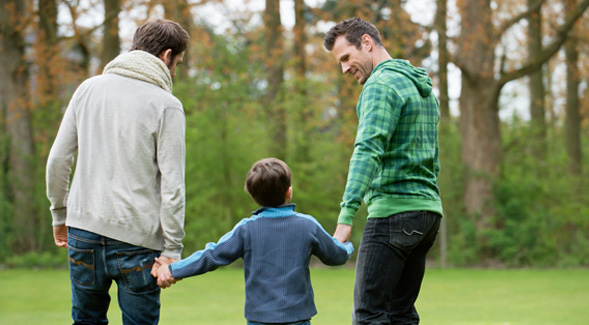Children of Same-Sex Parents Are Emotionally Healthy
SDSU researcher Jerel Calzos new study finds children of lesbian and gay parents do as well emotionally as their peers raised by heterosexual parents.

“As lesbian, gay, and bisexual-parented families become more visible, the findings bolster previous studies revealing that children raised in these families have psychological well-being comparable to children raised by heterosexual parents,” said the study’s lead author Jerel Calzo, an associate professor in SDSU’s Graduate School of Public Health. “In addition, the results indicate the need for continued investment in strategies to prevent sexual orientation-based discrimination and to support sexual minority parents who may experience minority stress.”
An estimated six million children and adults in the United States have an LGB parent, and nearly 220,000 children in the United States are being raised by parents in same-gender relationships.
For the study, researchers analyzed data from the National Health Interview Survey, an annual population-based household interview conducted by the U.S. National Center for Health Statistics. The researchers evaluated data collected between 2013 and 2015 for 21,103 children between the ages of 4 and 17. The surveys were filled out by parents or guardians who were asked to detail their children’s emotional and mental health difficulties using a so-called “strengths and difficulties” questionnaire (SDQ). In the questionnaire, parents and guardians were asked whether their child is well-behaved, seems worried, or is often unhappy, depressed or tearful.
Children of bisexual parents had slightly higher SDQ scores than children of homosexual or heterosexual parents. But when researchers adjusted the data to account for parental psychological distress, this difference disappeared.
“Research shows that bisexual parents often experience more discrimination and victimization than their straight, gay or lesbian peers, which in turn may affect the well-being of their children,” said Calzo. “More research is needed to determine what factors contribute to increased psychological distress among bisexual parents so that those factors can be mitigated, which would in turn, promote more positive outcomes for the well-being of their children.”
Calzo collaborated with researchers from the University of California Los Angeles, as well as the Karolinska Institute in Stockholm, Sweden, for this study. The findings were recently published in the journal Child Development, a leading journal in developmental psychology.
Media Contacts:
|
Katie White Media Relations Officer (619) 594-2585 [email protected] |
Cory Marshall Media Relations Officer (619) 594-0279 [email protected] |



